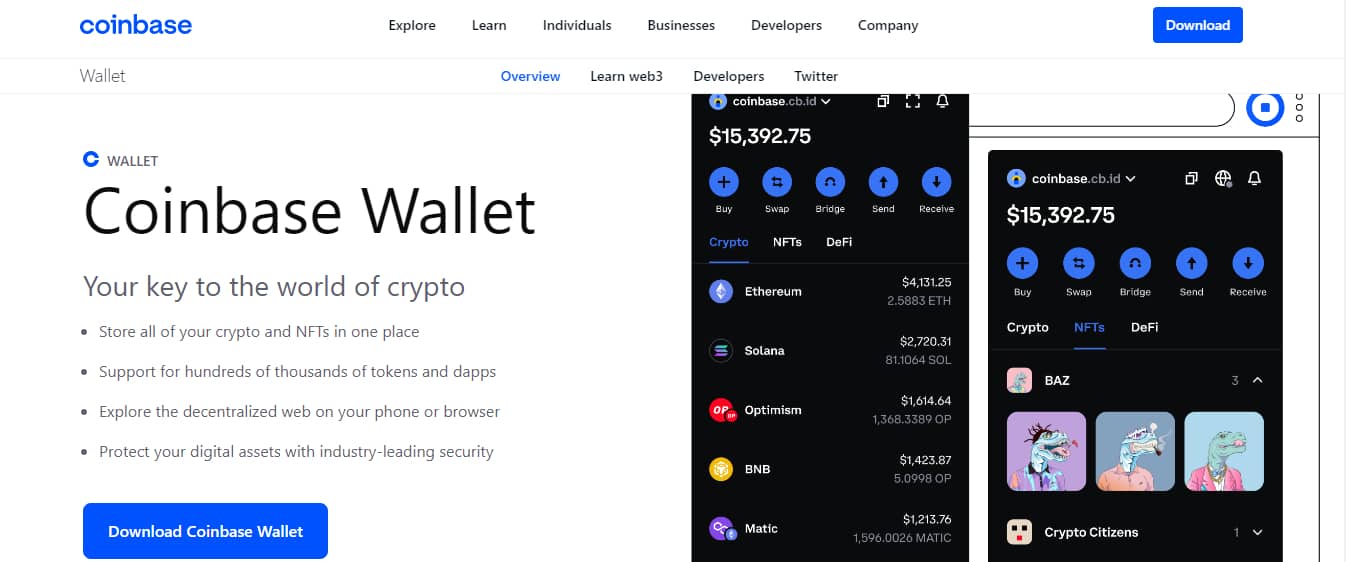

- 350+ Cryptocurrencies Listed
- <0.10% Transaction Fees
- 120 million Registered Users
- Secure Asset Fund for Users
- Earn On Deposits

- US Based
- Start with as little as $10
- Buy and sell 200+ cryptocurrencies
- Pro Solution for larger traders
- Available in 190+ countries
The general public’s awareness of cryptocurrencies and their applications is growing. They offer a wide range of functionalities, such as investing, making payments, and using decentralized applications (dApps). Because of this, it is necessary to have a crypto storage solution that is not only easy to use but also reliable.
As the cryptocurrency market gained traction in the global economy, traders and investors began digging deeper into the world of cryptocurrency wallets. Among the vast offer of crypto storing solutions, Coinbase Wallet and Trust Wallet have swiftly emerged as two of the most popular cryptocurrency wallets available today.
To help you choose the best wallet for your needs, I compared Coinbase Wallet vs Trust Wallet.
What Is Coinbase Wallet?

Coinbase Wallet is a self-custody wallet, meaning that the user retains full control of their private keys and data associated with their cryptocurrency holdings. Among the several crypto wallets on offer in the Google Play and Apple App Stores, this one is frequently cited as a top pick.
When it first came out, Coinbase Wallet was designed to work with Ethereum and other ERC20 tokens in the burgeoning decentralized finance sector. Nowadays, this digital wallet is compatible with a wide variety of cryptocurrencies and has a robust set of integrations.
More importantly, the Coinbase Wallet app also doesn’t require you to create a Coinbase.com account, which adds to its user-friendliness and makes it ideal for beginners in crypto trading.
What Is Trust Wallet?

If you want easy access to your cryptocurrency but don’t want a third party to hold or control it, Trust Wallet is the way to go. Trust Wallet is a multi-currency, non-custodial digital wallet supporting over one million blockchain-based cryptocurrencies.
In essence, Trust Wallet is a mobile wallet that is primarily designed to operate on smartphones. It allows users to buy cryptocurrencies, easily swap coins, as well as buy and sell NFTs.
Trust Wallet serves as something akin to a bridge that connects individual blockchains by way of their nodes. Every blockchain has its own public addresses, which are used to encrypt and store all crypto assets.

- 350+ Cryptocurrencies Listed
- <0.10% Transaction Fees
- 120 million Registered Users
- Secure Asset Fund for Users
- Earn On Deposits

- US Based
- Start with as little as $10
- Buy and sell 200+ cryptocurrencies
- Pro Solution for larger traders
- Available in 190+ countries
Main Features
One of the most interesting facets of Coinbase Wallet is the ability to store and trade Ethereum-based NFTs. NFTs are built on the blockchain, a decentralized ledger that allows creators and companies to sell digital works of art, collectibles, music pieces, and other products that can be proven to be one-of-a-kind.
Coinbase Wallet differentiates from the competition because it can be integrated into dApps with relative ease. For interacting with dApps, there is a built-in browser that eliminates the need for users to frequently enter their login details during the course of a transaction.
This wallet can also be used for initial coin offers (ICOs). It enables Coinbase users to acquire stablecoins and new altcoins at competitive market pricing. In the bargain, the wallet allows you to shop at crypto-friendly businesses and gather unique pieces of digital art, such as NFTs.
When it comes to cryptocurrency storage solutions, many people choose Trust Wallet. By using the wallet, you can swap, transfer, receive, and store Bitcoin as well as a large number of other cryptocurrencies in the most user-friendly manner possible. Additionally, it works with over 160 different digital assets.
With Trust Wallet, you can also get interest on your cryptocurrency holdings. In addition to that, a Web3 browser is already pre-installed on the device, so you’ll have no trouble accessing decentralized games or playing games based on blockchain technology. As an added bonus, the wallet facilitates internal trading via Uniswap and PancakeSwap.
Security
When it comes to keeping the user’s assets secure, Coinbase Wallet makes use of a variety of different security measures to achieve this goal. The first is that it employs the tried-and-true method of keeping private keys under lock and key by using the Secure Element Technology.
Access to your wallet can be made even more secure using a variety of authentication methods, such as using a two-factor authentication protocol (2FA). One more way to confirm your phone number is through SMS authentication.
To further restrict access to the app, Coinbase Wallet makes use of the device’s passcode, fingerprint scanner, or other security feature. In addition, the wallet’s balance is covered by insurance.
Trust Wallet is a digital storage solution that uses a high level of security while still protecting the privacy of its users. In other words, the wallet won’t require you to provide any Know Your Customer information. Since this is a non-custodial wallet, you need not worry about storing any information either.
Just like with the Coinbase Wallet, a two-factor authentication (2FA) is also used to restrict who can use the app. Verification of mobile phone numbers and electronic mail addresses is accomplished by means of SMS and email, respectively.
Last but not least, the private key to your wallet is kept on the device you use to access the wallet and not on any servers associated with the wallet. This app also makes use of the device’s biometric authentication features, such as Face ID, Touch ID, and passwords.

- 350+ Cryptocurrencies Listed
- <0.10% Transaction Fees
- 120 million Registered Users
- Secure Asset Fund for Users
- Earn On Deposits

- US Based
- Start with as little as $10
- Buy and sell 200+ cryptocurrencies
- Pro Solution for larger traders
- Available in 190+ countries
Supported Cryptocurrencies
DeFi wallets like the Coinbase Wallet make it simple for users to acquire Ethereum ERC-20 tokens or any other type of digital currency, store them securely, or link them to specific DeFi projects.
More specifically, Coinbase Wallet is interoperable with thousands of different tokens, including all ERC-20 tokens and all tokens on EMV-compliant chains like Polygon and Avalanche C-Chain. This covers stablecoins (such as USDC and DAI) on all of the networks that Coinbase Wallet is compatible with. Tokens issued by nodes on the Solana Network are also compatible with Coinbase Wallet.
Trust Wallet puts a premium on versatility in all aspects of its operation. To be specific, the BNB Chain allows users to exchange BTH, Ethereum-based coins, and NFTs, as well as cryptocurrency and NFTs, all through a single mobile application.
Furthermore, the wallet is compatible with more than a million tokens. Thus, users can buy a wide variety of cryptocurrencies via third-party payment providers like MoonPay, Mercuryo, Simplex, Ramp Network, Wyre, and Transak.
Supported Blockchains and Integrations
Coinbase launched WalletLink in 2019, which gave developers the option for users to access their decentralized applications (dApps) on any desktop. This enabled Coinbase Wallet to be used for transactions on devices other than mobile phones.
WalletLink was relaunched as Coinbase Wallet SDK at the beginning of 2022. Nonetheless, it continues to be accessible to any dApp creator and wallet as an open-source and reliable connection to integrate your Coinbase Wallet.
Within Trust Wallet, there is a web3 browser that is pre-installed, and users can use this browser to acquire cryptocurrencies through a native decentralized exchange (DEX) that is associated with the Kyber Network. Trust Wallet users are also provided with streamlined access to decentralized applications (dApps) built on the Ethereum platform.
In addition to this, Trust Wallet has formed a partnership with StableUSD (USDS) to give its users a platform that enables them to send payments anywhere in the globe without experiencing the high fees and inconvenience or dealing with the unstable exchange rates that are often connected with such financial dealings.
Finally, using the Wallet Connect functionality, it’s simple to communicate with any desktop dApps while protecting your private keys and recovery phrases with end-to-end encryption.
Coinbase Wallet vs Trust Wallet Fees
When you use Coinbase, you won’t have to worry about paying any additional fees for using a wallet. But when making a financial transaction or interacting with a smart contract, users must pay blockchain transaction fees.
A smart contract is a self-executing program set to run when a certain set of criteria is met. These digital contracts make it possible for programmers to create apps that run independently on the blockchain.
In addition to this, transaction costs can be adjusted, allowing customers to choose the amount of money they choose to put toward blockchain fees. When users pay more in fees, the transaction clears more quickly.
On the other hand, there are no fees associated with using Trust Wallet on your end. At least there won’t be any unexpected fees added to your bill each month. You can use the integrated DEX to trade between different cryptocurrencies, or you can use the dApp browser to access and interact with decentralized applications free of charge.
The only Trust Wallet costs incurred are those associated with the transaction processing on the app, which is actually a requirement imposed by the miners and the proof-of-stake chains.
User-Friendliness and Accessibility
These two digital wallets are great options for securely storing your cryptocurrency. However, in terms of convenience, I find that Coinbase Wallet is the superior one, as it is compatible with both Android and iOS devices, as well as a desktop web browser. Trust Wallet, on the other hand, is only available as a mobile application for use on smartphones.
Coinbase Wallet also has a browser add-on that can be installed on Chrome, Firefox, and other major web browsers. Trust Wallet, however, does not offer any kind of PC support. Consequently, if you ever need to handle your finances from a desktop computer while using Trust Wallet, you won’t be able to. In this particular scenario, though, Coinbase Wallet proves to be invaluable.
Conclusion
There’s no need to go all out to find the best cryptocurrency wallet. The most important thing is to get a wallet that works for you in terms of price and/or ease of use.
Trust Wallet is a viable compromise for cryptocurrency traders who favor the security of a cold wallet but require the speed of a hot wallet. There are typically zero usage costs associated with this app. One significant drawback, however, is that the app is only available on mobile devices, with no desktop counterpart.
On the flip side, you can use the trustworthy and user-friendly Coinbase Wallet to store and access your cryptocurrency holdings. On the downside, the price of this service may be pricey. Ignoring that, it’s a good and safe wallet overall.

